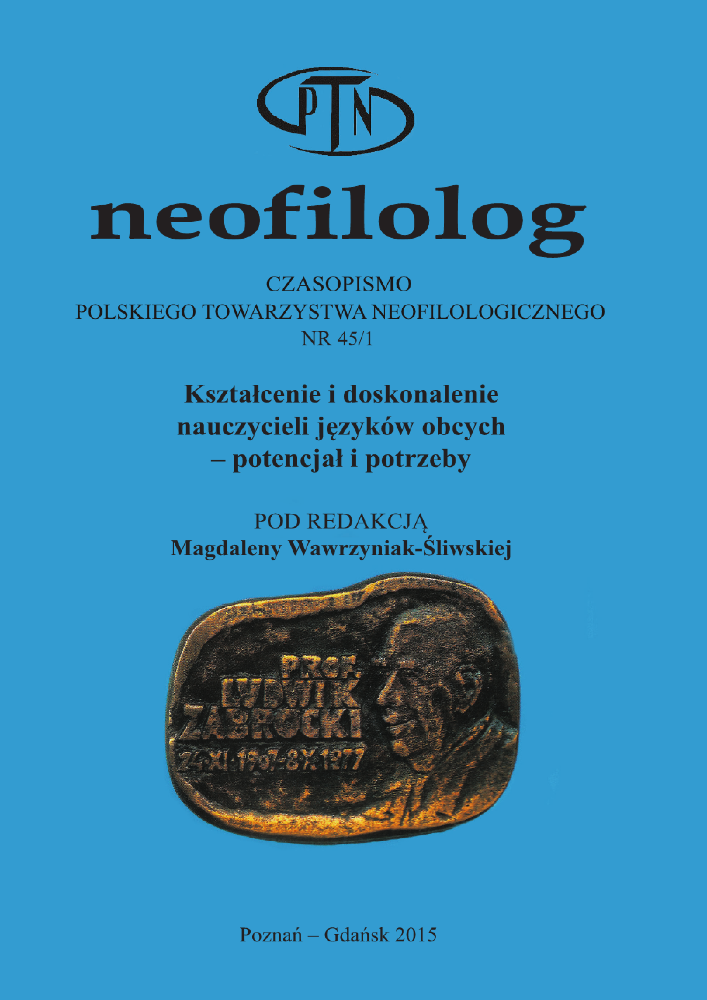Abstract
Reflection in teacher development is important as it can help both experienced
and novice teachers to better understand the processes they
are involved in. It can also be used to aid evaluation processes. This paper
presents a small scale study that involved undergraduate English
philology students from Gdańsk University who were studying for the
teacher specialisation. One of its purposes was to trial a strategy for
feedback that could be used to mediate an already existing model of
assessment for students’ taught lessons, which previous to the study
used only a prescribed set of assessment criteria. Another purpose was
to promote a reflective turn in both the student-teacher and academic
mentor (myself), which would then inform the discussions that took
place after each observed lesson. In addition to this, I was interested to
find out if this strategy would generate a suitable quality and quantity
of information, so that it might be used for further research. Overall,
the strategy proved a useful aid to reflection in relation to the students’
teaching practices. As a research tool, it also generated usable data.
References
Bruner, J. 1996. The Culture of Education. Cambridge: Harvard University Press.
Galewska-Kustra, M. 2009. „Studium przypadku w pedagogicznych badaniach nad twórczością. W poszukiwaniu praktycznych zastosowań metody” (w) Metody pedagogicznych badań nad twórczością. Teoria i empiria (red. K.J. Szmidt). Łódź: Wydawnictwo Akademii Humanistyczno-Ekonomicznej w Łodzi: 225-275.
Heron, J. Reason, P. 1997. „A participatory inquiry paradigm”. Qualitative Inquiry 3(3): 274-294.
Kębłowska, M. 2006. „Transferring ELT knowledge to the classroom – results of a study”. Glottodidactica 32: 159-171.
Mann, S. 2004. „Evaluation” (w) Adults learning languages: A CILT guide to good prac-tice (red. H. Harnisch i P. Swanton). London: CILT:113-129.
Mann, S. i Walsh, S. 2015. „Reflective dimensions of CPD: supporting self-evaluation and peer-evaluation” (w) Teacher evaluation in second language education (red. H. Donaghue i A. Howard). London: Bloomsbury Academic: 17-34.
Mead, G.H. 1962. Mind, Self and Society: From the Standpoint of a Social Behaviourist. Chicago: The University of Chicago Press.
Mercado, L. A. i Mann, S. 2015. „Mentoring for teacher evaluation and development” (w) Teacher evaluation in second language education (red. H. Donaghue i A. Howard). London: Bloomsbury Academic: 35-54.
Schwandt, T.A. 1994. „Constructivist, interpretivist approaches to human inquiry” (w) Handbook of qualitative research (red. N.K. Denzin i Y. S. Lincoln). London: Sage Publications: 118-137.
Sullivan, H. S. 1953. The Interpersonal Theory of Psychiatry. New York: W.W. Norton & Company, Inc.
Wallace, M.J. 2008. Action Research for Language Teachers. Cambridge: Cambridge University Press.
Witkowski, L. 2007. „Kwadratura aksjologicznego AIDS w pedagogice” (w) Edukacja wobec sporów o (po)nowoczesność (red. L. Witkowski). Warszawa: Instytut Ba-dań Edukacyjnych: 141-152.
van Teijlingen, E. R. i Hundley, V. 2001. „The importance of pilot studies”. Social Re-search Update 35. http://sru.soc.surrey.ac.uk/SRU35.html DW 11.10.2014
License
Copyright (c) 2019 Neofilolog

This work is licensed under a Creative Commons Attribution-NoDerivatives 4.0 International License.
Authors
Authors of texts accepted for publication in Neofilolog are required to complete, sign and return to the Editorial team’s office the Agreement for granting a royalty-free license to works with a commitment to grant a CC sub-license.
Under the agreement, the authors of the texts published in Neofilolog grant Adam Mickiewicz University in Poznań a non-exclusive, royalty-free license and authorize the use of Attribution-NoDerivatives 4.0 International (CC BY-ND 4.0) Creative Commons sub-license.
The authors retain the right to the free disposal of the work.
Users
Interested Internet users are entitled to use works that have been published in Neofilolog since 2017, under the following conditions:
▪ attribution – obligation to provide, together with the distributed work, information about the authorship, title, source (link to the original work, DOI) and the license itself.
▪ no derivatives – the work must be preserved in its original form. Without the author's consent, it is not possible to distribute the modified work in the form of translations, publications, etc.
Copyrights are reserved for all texts published since 2017.
Miscellaneous
Adam Mickiewicz University in Poznań retains the property right as a whole (layout, graphic form, title, cover design, logo etc.).
